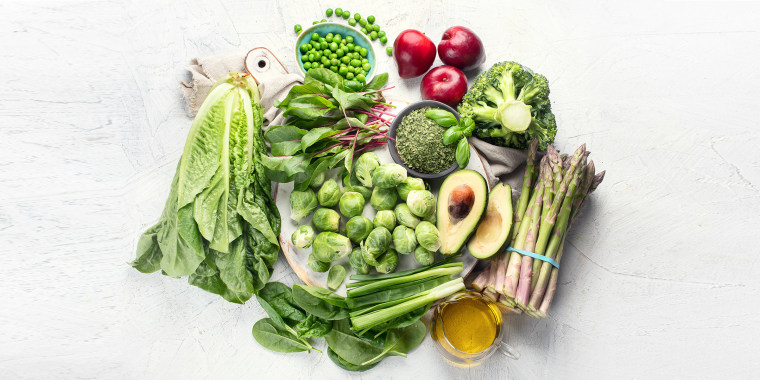It’s the first vitamin you received when you were born, and it turns out vitamin K may be a factor in healthy aging as well, helping to keep veins and arteries flexible as the body gets older.
Every baby in North America receives a vitamin K shot after entering the world to support healthy blood clotting during infancy. But the nutrient soon gets overshadowed by the more well-known vitamins like A, B, C, D and E.
Researchers called it underappreciated.
“I think very few people know very much about vitamin K and I would argue a lot of what they do know is not driven by the scientific literature, but more by organizations for profit benefiting from vitamin K supplementation,” Sarah Booth, director of the Jean Mayer U.S. Department of Agriculture Human Nutrition Research Center on Aging at Tufts University, in Boston, and leader of its vitamin K team, told TODAY.
The primary function of vitamin K is to support normal blood clotting. Another task is to make proteins for healthy bones.
It also has a role in preventing calcification — a process in which calcium that should dissolve in the blood builds up in body tissue instead, causing the tissue to harden and leading to health problems. Calcium depositing in the arteries, for example, is part of atherosclerosis. Calcification can also happen in the kidneys, lungs and brain.
The concern is that when this happens in veins and arteries, they become stiffer and blood pumps less efficiently.
But there are certain proteins that prevent calcification, and vitamin K is required for them to function, said Kyla Shea, a scientist on the vitamin K team at Tufts.
Yet it’s estimated two-thirds of men and about 40% of women over 70 don’t consume enough vitamin K — a stage in life when they may need it most, the researchers said.
Shea is the lead author of a recent study that found vitamin K may offer protective health benefits as we age.
The findings are based on data from almost 4,000 people whose vitamin K blood levels were measured and who were followed for about 13 years. The participants were 65 years old on average and more than one-third, 35%, were non-white.
People with the lowest vitamin K levels had a 19% higher risk of dying prematurely from any cause compared to those who had adequate intake of the vitamin — though the study found no significant associations between vitamin K levels and heart disease.
“(Calcification) can happen in vessels throughout the body and that’s linked to arteries becoming stiffer. That seems to be the link with mortality — not necessarily a heart attack or cardiovascular disease, per se,” Shea said.
“One of the takeaways could be that older adults might want to be more cognizant of their vitamin K intake, especially since most — especially older men — don’t consume the recommended amount.”
Vitamin K levels are not measured during routine doctor visits, the experts said. There aren’t many overt symptoms of a deficiency, though easy bruising might suggest a person lacks enough of the vitamin.
How to get enough vitamin K:
There are different types of the nutrient, but most people get it from plants.
It is “very, very easy” to get adequate vitamin K by following general guidance on a healthy diet, Booth said. The government’s current dietary guidelines for Americans recommend eating 2 cups of fruit and 2.5 cups of vegetables every day.
Particularly good sources of vitamin K include green leafy vegetables such as kale, lettuce and collard greens. “We always tell people that the greener the vegetable, the more vitamin K there’s in it,” Booth noted. That also includes Brussels sprouts, cabbage, asparagus and green peas. Dark berries are another good source.
The most common sources of vitamin K in the U.S. diet are spinach, broccoli and iceberg lettuce; and fats and oils, particularly soybean and canola oil, according to the National Institutes of Health.
Vitamin K is a fat-soluble vitamin and needs a little oil or fat to be absorbed, so when people eat their salads, there should be some fat in the dressing or a bit of cheese on top, the experts advised. They didn’t advocate using a supplement.
Vitamin K and blood thinners:
Vitamin K can have a potentially dangerous interaction with blood thinners like warfarin, so people taking the medication should avoid abrupt changes to their diet, the National Institutes of Health warned. That's because a sudden fluctuation in vitamin K intake can boost or decrease the anticoagulant effect, it noted.
If you’re taking a blood thinner, talk with your health care provider before changing your diet.


